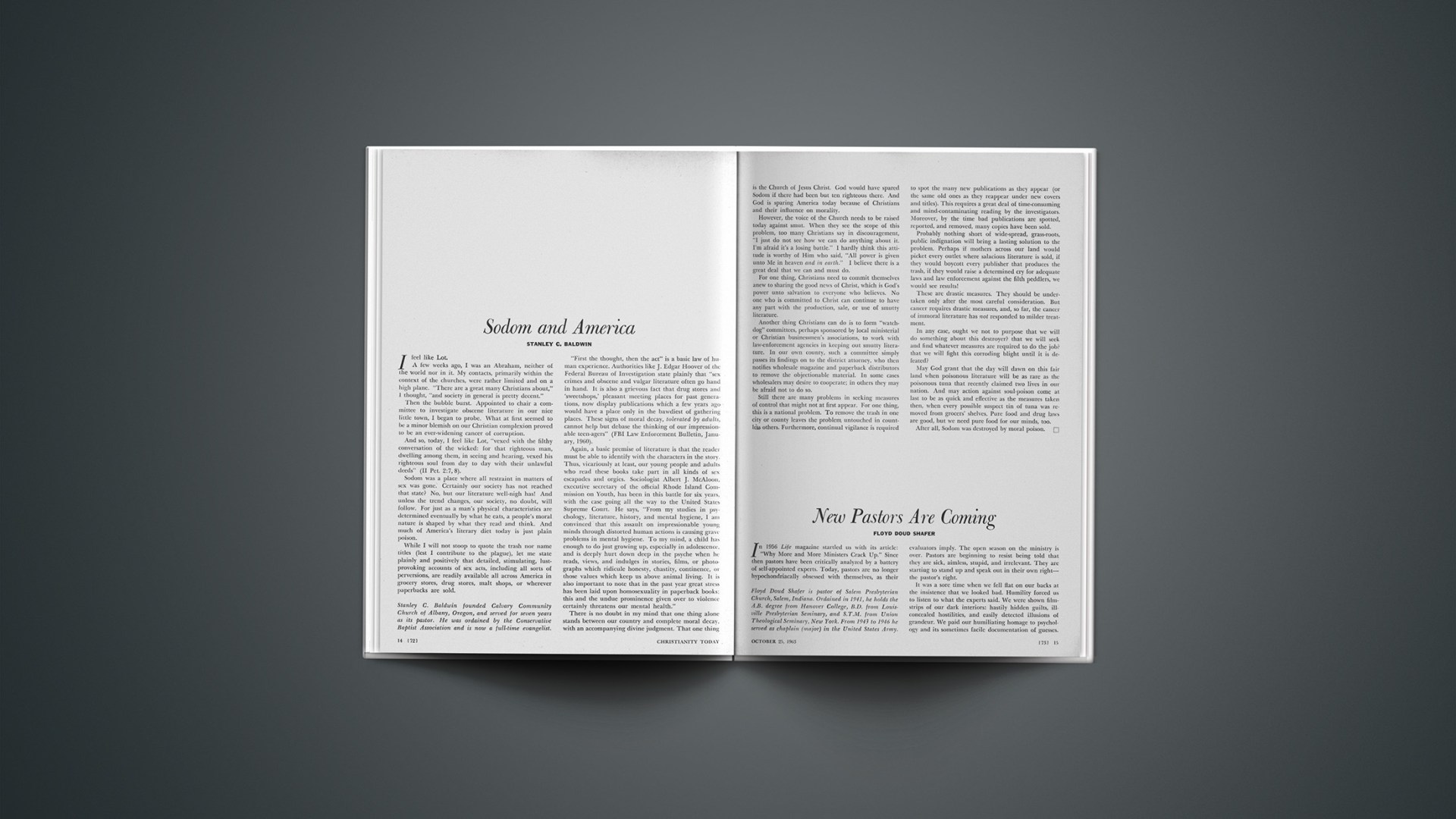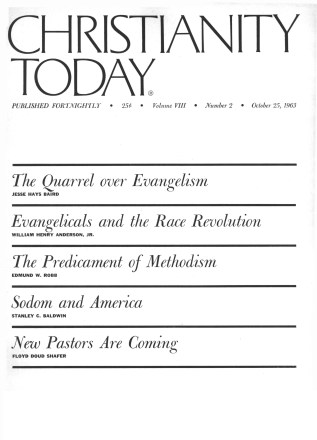In 1956 Life magazine startled us with its article: “Why More and More Ministers Crack Up.” Since then pastors have been critically analyzed by a battery of self-appointed experts. Today, pastors are no longer hypochondriacally obsessed with themselves, as their evaluators imply. The open season on the ministry is over. Pastors are beginning to resist being told that they are sick, aimless, stupid, and irrelevant. They are starting to stand up and speak out in their own right—the pastor’s right.
It was a sore time when we fell flat on our backs at the insistence that we looked bad. Humility forced us to listen to what the experts said. We were shown filmstrips of our dark interiors: hastily hidden guilts, ill-concealed hostilities, and easily detected illusions of grandeur. We paid our humiliating homage to psychology and its sometimes facile documentation of guesses.
We were warned to expect a crack-up around every comer. We thought it wise to learn to dance on eggs. We probed our souls, irrigated our minds, and put our blown-up problems in the showcase for public view. A groan floated across the land: “Oh, those poor sick ministers.”
Our critics erred when they immobilized us on our backs. That position permits only one line of vision: up. We saw towering above us one known of old as the Good Physician. His prescription penetrated our fevered ears: “Take up your bed and walk.” Enfeebling obsession with possible ailments fled, and a long-tested formula, “My grace is sufficient,” became an exhilarating challenge. The wrong people were put to bed, and we are standing up to say so. The macerating surgeons of our souls stand aghast, and they should!
With gnawing remorse we heard proof that nothing justified our existence as ministers of the Word. We were dared to show our accomplishments, produce our credentials, and parade our results. When we couldn’t, or wouldn’t, we were told to quit, tear up the dream, and strive no more. We were badgered into choosing between false alternatives: either produce results or quit. We didn’t want to be in this business of ministering in the Word, or caring for souls, in the first place. Why not quit? Maybe our stance was just a self-induced trance. On that dimension, quitting was the only sensible decision.
Dour ones came to preside over our demise: some brought flowers and some brought black crepe. We were finished. We smiled at the flowers and wept at the crepe.
The Call To Obedience
But life is tenacious and God insistent. Men began to reconsider the matter. Questions flew from manse to manse and parsonage to parsonage. Who told us we were to have success in the first place? Who promised us that working with the Word would immediately produce worth in the world? Who said the care of souls would terminate with all souls cured?
A suspicion knifed its way to a new conviction: our job was to be faithful to the Word and loyal to souls: results were not ours to expect, or receive. We are not at the quitting point of either failure or success. We’ve been forced back on Christ, and he proffers the cross coupled to the command, “Follow me.” Recommitted men don’t go around their problems: they go through them. They will give, but not give up.
Many spoke of our stupidity. We were made sensitive to our ignorance and perceptive of our errors. Experts counseled us to consider the course of culture under their benign guidance.
We were students all, and from long to late we poured over volumes of profane and sacred lore. We knew something of how much we didn’t know. Some said we were too busy to have a grasp of essentials, and others said we were so barricaded from life that we could not know existentials. Our guilt was obvious, one way or the other.
What could we do? We called for the man with the wheelbarrow full of books. Maybe the angels do laugh, but we didn’t. We hung on the gems of truth issuing from the professorial wise ones. We could scarcely wait for the next volume, either from dialectical divinity or from pornographic deviltry, to tell us which way God was going in our culture. The wheels spun, the paper flew, and publishers flooded the land with wisdom. Savants promised to translate it into neat systems for us: plain, easy, quick—just the ticket for not-too-bright pastors. And administrators promised multi-colored, turn-over charts. The pulpit was to have wisdom again!
A Fresh Breeze Appears
That won’t go down. What is this appearing in the land? Here are pastors who can think, ministers who have read avidly for decades, men who are critical of those who profess to know all, pastors who can use words well, and ministers long since alert to the wisdom of a Book that somewhat antedates the cerebrations of the lately wise. Here are ministers who measure men’s wisdom against the true Man. They have discovered that knowing Him in love and serving him in devotion are parts of wisdom not likely to be altered by the next theological discovery. These men will not cease to love books, but they know they will find their truths, if they have them, in the light of Him who is Truth. Pastors are weary of being treated like nincompoops, and the intelligent resistance they are asserting comes as a fresh breeze across a musty room stifling with stale assumptions.
The final blow fell when pastors were told that they were a detriment to laymen, that their position made laymen second-class Christians, and that laymen resented the leadership of pastors. The critics said pastors were irrelevant and that an informed, sensitive, and expert laity was anxious to enthrone itself on the issues and decisions of existence. We heard that an ineluctable progress had ground out its ways leaving us behind as its useless dust.
Rumor had it that pastors could keep their positions within the church building, play around with liturgics, and amuse themselves with administrative tiddlywinks. In the real world, however, where living is live and words useless, the new layman would bring Christ into the market, the office, the parlor, and the arena.
Our antagonists spoke learnedly of the final blossoming of the universal priesthood of all believers. Pastors had worked for that goal across many centuries. When we were told that the goal was reached, we agreed to step aside.
We listened to hear report of Christ’s being enthroned in politics, play, businesses, and highways. But the old staccato of bitter words, the old sway of selfish ways, the old greed and graft, and the old shrieking crashes shot up from life like flames from a fiery furnace.
When laymen began to ask why we had withdrawn, we became suspicious. We assumed they wanted freedom from us. It turned out that the only group more surprised than we about this independent laity was the laity itself. The clergy-laity squabble was not the invention of laymen: it was the brain-child of ivory-towered men discoursing before captive audiences. The laity neither thought of it, nor approved it when told about it.
Then the laymen, with that instinctive wisdom that has been theirs across the years, called, not for the ivory-towered ones or the executive trouble-shooters, but for their own pastors. That call jerked us back to reality.
Heeding The Right Voices
Too long did we listen to the wrong voices. Too long did we take generous advice from poorly informed sources. Now men of the Word are aroused, and who will blame them for the claim of urgency in their coming, or for the flame of impatience in their voices?
Watch them coming now. See them ready to give and give again, in Christ’s name. Observe a divine love bursting through the muscles of men who have no life but love. Hear them raise up the challenges of brotherhood, and walk in its ways till felled. Hear them speak the truth in love, neither muting the truth nor sentimentalizing the love. Watch them strike out against the filth from the depths. See them grapple with whatever destroys the purity of homes. See them come not as buddies to be coddled or as boys to be bossed but as men to mediate the causes of eternity in the midst of time. Watch them at the head of companies striving toward the throne of grace, struggling to recapture reason’s citadel, going knee-bent to Calvary’s brow where they live. See them stand with little ones, the last refuge of hope against a hell that will pander their little souls for a dollar’s gain. Hear them tell men bound under the quaking, fear-shrouded cities of earth about a city with foundations, whose builder and maker is God. See them, world, and mark them well. Their love for their own, and all Christ’s own, knows no limits. Of course they fail, make errors, and falter—but still they come, heralds loved of God and men and sacred to both. No banners proclaim their coming and no placards boast their names, but in the chill of the night, when feet grate on the cold gravel, these men of the Word come with a warmth from God.
The debunking of the ministry of the Word fails, and the cultural kick backfires: the sophisticated theological esthetes have had their day. Now a goodly company of disciplined ministers rises in the land. Their heads are high, their minds are alert, and their hearts reach out to brethren. These men are talking back; they are contesting error’s sway and disputing wrong’s rule. They are not afraid to fail and are less concerned to succeed: they are bound only to be found serving in the name of the Son of Man.
They shall continue to come—borne, trained, and sustained by the people of God. A Saviour sends them, a people supports them, and a world needs them. They seek to be true though all else prove false. They come not alone—they come as Christ’s own.
Floyd Doud Shafer is pastor of Salem Presbyterian Church, Salem, Indiana. Ordained in 1941, he holds the A.B. degree from Hanover College, B.D. from Louisville Presbyterian Seminary, and S.T.M. from Union Theological Seminary, New York. From 1943 to 1946 he served as chaplain (major) in the United States Army.










